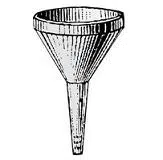The first thing we are going to do to discover the meaning of the term funnel is to know its etymological origin. In this case, you must know that it derives from Latin, specifically from the word "imbutum", which can be translated as "soaked" and that it emanates from the verb "imbuere", which is synonymous with "soak" or "impregnate".
This is the name given to a hollow device, similar to a cone , that is narrow in its lower part and wide in its upper part. This shape makes it useful for transferring liquids .
 For example: “With the help of a funnel, the man filled his motorcycle with fuel and resumed his journey,” “Please hand me the funnel so I can transfer the product from the drum to the bottle,” “I need a funnel to add oil to the engine. ” ” .
For example: “With the help of a funnel, the man filled his motorcycle with fuel and resumed his journey,” “Please hand me the funnel so I can transfer the product from the drum to the bottle,” “I need a funnel to add oil to the engine. ” ” .
Funnels are used to channel fluids or materials that occur as particles or grains. The lower sector of the instrument, with the appearance of a cylinder , is introduced into the container where the substance is intended to be deposited. Then, through the mouth of the funnel, the liquid or material in question is poured.
It is possible to find glass funnels , plastic funnels and metal funnels . Their uses are very varied: they can be found in the field of gastronomy, in mechanical workshops and in companies dedicated to the production of cereals , to name a few possibilities.
In chemical laboratories, the use of glass funnels is common. There are dripping funnels , filtering funnels , settling funnels , and other kinds of these same objects.
On the other hand, this concept is used to refer to everything that adopts a shape similar to that of the funnel, whether in a physical or symbolic sense: “I was detained for more than two hours in a road funnel,” “When I saw the funnel of clouds over the sea, the captain of the boat felt fear,” “We must work to optimize our sales funnel and increase income.”
In the same way, we cannot ignore the existence of what is known as the law of the funnel, which is used, above all, in matters of rights. Specifically, with this concept what is intended to be expressed is that an injustice has occurred because in a dispute, not the one who is right has won, but rather the one who is stronger, the one who has more power.
Precisely because of this, it is indicated, therefore, that it violates the rights of equality before what the law is and against justice. Likewise, in this case we can establish that it determines a clear and forceful criticism against what are the so-called de facto powers.
In this sense, we cannot ignore the existence of a Spanish film titled “The Law of the Funnel.” It premiered in 2018, is directed by Alfredo Carrasco and has a cast made up of actors of the caliber of Carlos Manuel Díaz, Bárbara Hermosilla and Tony Melero.
Corruption and injustice are the pillars of this film starring a mother with a daughter in charge and a banker.
